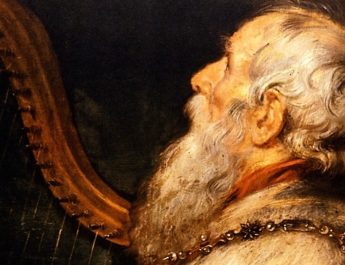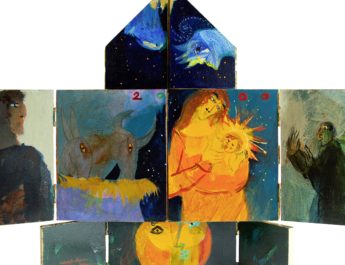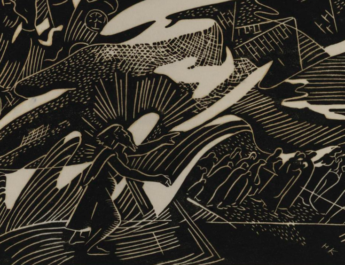Psalm 135B
1 PraiseA the Lord!B
Praise the nameC of the Lord;D
give praise, O servantsE of the Lord,F
A “praise” = halal. This is to be clear – it originally referred to a sound, then a color. It was to shine and then make a show or boast then to rave. In a causative sense it came to mean celebrate, give glory, sing praise, or be worth of praise. Because of the celebratory nature of the word, it could also mean to give in marriage. This is where Hallelujah comes from.
B “Lord” = Yah. From YHVH (proper name of the God of Israel; God, Lord; the self-existent or eternal one); from havah (to become) or hayah (to be, become, happen)}. This is Lord or God – a shortened form of God’s most holy name.
C “name” = shem. May be from sum (to put, place, set). This is name, fame, renown. A name was thought to indicate something essential about a person – something about their individuality. So, this word can also mean honor, authority, or character.
D “Lord” = YHVH. Related to “Lord” in v1. See note B above.
E “servants” = ebed. From abad (to work, serve, compel; any kind of work; used causatively, can mean to enslave or keep in bondage). This is a servant, slave, or bondservant.
F “Lord” = YHVH. Same as “Lord” in v1. See note D above.
2 you who standG in the houseH of the Lord,I
in the courtsJ of the house of our God.K
G “stand” = amad. This is to stand up in a literal or figurative sense. So it can be establish, continue, endure, take a stand, act, be a servant, stand still, remain, stand against an enemy.
H “house” = bayit. Probably from banah (to build, make, set up, obtain children; to build literally or figuratively). This is house, court, family, palace, temple.
I “Lord” = YHVH. Related to “Lord” in v1. See note B above.
J “courts” = chatser. From chatsar (to blow a trumpet, trumpeter, to surround); from chatsotsrah (trumpet). This is an enclosure or court – a yard that is fenced in. It could also be a village or hamlet that is walled in.
K “God” = Elohim.
3 Praise the Lord,L for the LordM is good;N
singO to his name, for he is gracious.P
L “Lord” = Yah. Same as “Lord” in v1. See note B above.
M “Lord” = YHVH. Same as “Lord” in v1. See note D above.
N “good” = tob. From tob (to be pleasing, to be good). This is good, beautiful, pleasant, agreeable, bountiful, at ease. This word is used for goodness as a concept, a good thing, a good person. This can refer to prosperity and welfare as well as joy, kindness, sweetness, and graciousness. So, this is ethically good, but also enjoyably good.
O “sing” = zamar. Perhaps from zamar (to trim or prune). This is making music. It is used specially of music to worship God. So, music with singing, singing praise, or singing psalms.
P “gracious” = na’iym. 13x in OT. From na’em (to be pleasant or lovely; to surpass in beauty; to be delightful in a literal or figurative sense). This is sweet, lovely, or delightful.
4 For the LordQ has chosenR JacobS for himself,
IsraelT as his own possession.U
Q “Lord” = Yah. Same as “Lord” in v1. See note B above.
R “chosen” = bachar. This is to choose, appoint, try, excellent.
S “Jacob” = Yaaqob. From the same as aqeb (heel, hind part, hoof, rear guard of an army, one who lies in wait, usurper). This is Isaac’s son and his descendants. The name means heel-catcher or supplanter.
T “Israel” = Yisrael. Related to “God” in v2. From sarah (to persist, exert oneself, contend, persevere, wrestle, prevail) + el (see note K above). This is Israel, meaning God strives or one who strives with God; new name for Jacob and for his offspring. This refers to the people and to the land.
U “possession” = segullah. 8x in OT. Root may mean to shut up – as treasure or wealth that is kept. Could be property, jewel, or any possession.
5 For I knowV that the LordW is great;X
our LordY is above allZ gods.AA
V “know” = yada. This is to know, acknowledge, advise, answer, be aware, be acquainted with. Properly, this is to figure something out by seeing. It includes ideas of observation, recognition, and care about something. It can be used causatively for instruction, designation, and punishment.
W “Lord” = YHVH. Same as “Lord” in v1. See note D above.
X “great” = gadol. From gadal (to grow up, become great, become wealthy – to advance. The root meaning may be to twist in the sense of the process of growing). This is great, high, bigger, noble, old, marvelous. It can also refer to someone who is powerful or distinguished.
Y “Lord” = Adonai. From adon (lord, master, owner); root means to rule or be sovereign. This is the actual Hebrew word for Lord used (in a different form) of humans and (in the present form) of God. It means someone who is in control.
Z “all” = kol. From kalal (to complete). This is all or every.
AA “gods” = elohim. Same as “God” in v2. See note K above.
6 WhateverBB the LordCC pleasesDD he does,EE
BB “whatever” = kol. Same as “all” in v5. See note Z above.
CC “Lord” = YHVH. Same as “Lord” in v1. See note D above.
DD “pleases” = chaphets. Properly, this means inclined towards or bending to. Figuratively, it means to desire, delight in, or be pleased with.
EE “does” = asah. This is to make, do, act, appoint, become in many senses.
in heavenFF and on earth,GG
in the seasHH and all deeps.II
FF “heaven” = shamayim. Root may mean being lofty. This is sky, the air, or heaven. It is in a dual noun form so this might refer to the part of the sky where the clouds move on the one hand and the part beyond that where the sun, moon, and stars are on the other hand.
GG “earth” = erets. Root may mean to be firm. This is earth, ground, field land, or country.
HH “sea” = yam. Root may mean to roar. This is the sea, often referring to the Mediterranean. It comes from the root in the sense of the roar of crashing surf. This word is sometimes used for rivers or other sources of water. It can mean to the west or to the south.
II “deeps” = tehom. Perhaps from hum (to roar, murmur, cause an uproar, agitate; to defeat in battle, destroy). This is the deep or the abyss. Either understood as a formless empty place of nothingness or as a place of confusion filled with water – the deep the feeds the waters of the earth.
7 He it is who makes the cloudsJJ riseKK at the endLL of the earth;
JJ “clouds” = nasi. From nasa (to lift in a broad sense, literally and figuratively; to carry, take, or arise; to bring forth, advance, accept). This is one lifted up or exalter. So, it could be prince, chief, ruler, captain, king, or vapor.
KK “makes…rise” = alah. This is to go up, approach, ascend, be high, be a priority; to arise in a literal or figurative sense.
LL “end” = qatseh. From qatsah (to cut off, cut short; figuratively, to destroy). This is end, brink, border, edge, frontier. It can refer to that which is within set boundaries.
he makesMM lightningsNN for the rain
and brings outOO the windPP from his storehouses.QQ
MM “makes” = asah. Same as “does” in v6. See note EE above.
NN “lightnings” = baraq. From baraq (to flash, a flash of lightning). This is lightning. Figuratively, it could be a gleaming or glittering. Concretely, it could be a flashing sword.
OO “brings out” = yatsa. This is to go or come out, bring forth, appear. It is to go out in a literal or figurative sense.
PP “wind” = ruach. This is breath, wind, air, cool, spirit. This is wind, which resembles the breath and so this can be used figuratively for life itself or being frail/mortal/impermanent. It can refer to the air of the sky or the spirit.
QQ “storehouses” = otsar. From atsar (to store up, hoard). This is treasure or the place where one keeps treasure – a depository, storehouse, armory, cellar.
8 He it was who struck downRR the firstbornSS of Egypt,TT
both humansUU and animals;VV
RR “struck down” = nakah. This is to hit whether lightly or severely. It can be used in a literal or figurative sense. So, this could be beat, punish, give wounds, kill, or slaughter.
SS “firstborn” = bekor. From bakar (to bear fruit, be firstborn, firstling, that which opens the womb, give the birthright to). This is firstborn or chief.
TT “Egypt” = Mitsrayim. Perhaps from matsor (besieged or fortified place, bulwark, entrenchment; something hemmed in; a siege or distress or fastness); from tsur (to confine, besiege, to cramp). This is Egypt.
UU “humans” = adam. Perhaps from adam (to be red, make ruddy); related to adamah (ground, dirt, earth). This is man, humankind, also Adam’s name. It refers to a human individual or humanity.
VV “animals” = behemah. This is animal or cattle. It is often used of large quadrupeds.
9 he sentWW signsXX and wondersYY
into your midst,ZZ O Egypt,
against PharaohAAA and all his servants.
WW “sent” = shalach. This is to send out, away, send for, forsake. It can also mean to divorce or set a slave free.
XX “signs” = ot. From avah (to mark, sign, point out); OR from uth (to agree). This is a sign in a literal or figurative sense. It could be a flag or monument. It could be evidence or a mark. It could also be an omen or a miracle.
YY “wonders” = mopheth. Perhaps from yaphah (to be beautiful, decorate; root means being bright, which implies being beautiful). This is a wonder, miracle, symbol, sign, or omen.
ZZ “midst” = tavek. This is among, middle, in the midst, the center. Perhaps, properly, to sever.
AAA “Pharaoh” = Paroh. From Egyptian pr (palace, pharaoh; literally house + great). This is Pharaoh, a title for Egyptian kings. See https://en.wiktionary.org/wiki/pharaoh
10 He struck down manyBBB nationsCCC
and killedDDD mightyEEE kingsFFF—
BBB “many” = rab. From rabab (increasing in any aspect whether quantity, authority, size, quality, greatness, etc.). This is abundance, many, elder, exceedingly, great. It refers to abundance of amount, rank, or status.
CCC “nations” = goy. From the same root as gevah (the back, person, or body); related to gev (among); related to gaah (to rise up). This is nation or people. Often used to refer to Gentiles or foreign nations. It can also be used figuratively for a group of animals. This is where the Yiddish “goy” comes from.
DDD “killed” = harag. This is to strike with deadly intent so it can be kill, destroy, murder, or put to death.
EEE “mighty” = atsum. From atsom (to be many or mighty; could also refer to breaking bones). This is mighty or mighty one. It means powerful, which implies large numbers.
FFF “kings” = melek. From malak (to be or become king or queen, to rise to the throne, to be crowned; by implication, to take counsel). This is king or royal.
11 Sihon,GGG king of the Amorites,HHH
and Og,III king of Bashan,JJJ
and all the kingdomsKKK of CanaanLLL—
GGG “Sihon” = Sichon. Perhaps from the same a ssuach (Suach, a name); from the same as suchah (something swept away, refuse). This is Sihon or Sichon, a name perhaps meaning “tempestuous.”
HHH “Amorites” = Emori. From amar (to speak, say, answer, command, promise, report). This is Amorite or Emori, perhaps meaning talkers.
III “Og” = Og. From the same as uggah (bread cake, round ash cake); from ug (to gyrate, bake; baking a round cake). This is Og, a name perhaps meaning “round.”
JJJ “Bashan” = Bashan. Bashan is a place whose name may mean “smooth.”
KKK “kingdoms” = mamlakah. Related to “kings” in v10. From the same as melek (see note FFF above). This is kingdom, dominion, sovereignty, rule. It can also refer to the realm.
LLL “Canaan” = Kna’an. From kana’ (to be humble, subdue; properly, bend the knee). This is Canaan, his descendants, and the land where they settled. This could mean lowlands, describing their land or subjugated in reference to being conquered by Egypt. See https://en.wikipedia.org/wiki/Canaan
12 and gaveMMM their landNNN as a heritage,OOO
a heritage to his peoplePPP Israel.
MMM “gave” = natan. This is to give, put, set, offer. It is to give literally or figuratively.
NNN “land” = erets. Same as “earth” in v6. See note GG above.
OOO “heritage” = nachalah. Related to nachal (to inherit, occupy, distribute, take as heritage). This is properly something that was inherited. It can mean occupancy generally or, more particularly, an heirloom or an estate. This can be an inheritance, gift, possession, or portion.
PPP “people” = am. From amam (to darken, hide, associate; creating shadows by huddling together). This is people or nation. It can be used specifically for a tribe, collectively of troops or armies, or figuratively to refer to a flock of animals.
13 Your name, O Lord,QQQ endures forever,RRR
your renown,SSS O Lord,TTT throughout all ages.UUU
QQQ “Lord” = YHVH. Same as “Lord” in v1. See note D above.
RRR “forever” = olam. This is a long scope of time whether in the past (antiquity, ancient time) or in the future (eternal, everlasting).
SSS “renown” = zeker. From zakar (to remember, to mark something so that it can be recalled, to be mindful of, to mention). This is remembrance, renown, memento, recollection, or commemoration.
TTT “Lord” = YHVH. Same as “Lord” in v1. See note D above.
UUU “all ages” = dor + dor. Literally, “from generation and generation.” From dur (to move in a circle, which implies living somewhere or remaining there; it can also be the sense of piling or heaping up). This is a revolution of time, which is to say, an age or generation. It can also be a dwelling or one’s posterity.
14 For the LordVVV will vindicateWWW his people
and have compassionXXX on his servants.
VVV “Lord” = YHVH. Same as “Lord” in v1. See note D above.
WWW “vindicate” = din. This is to judge, defend, dispute, govern, quarrel, plead.
XXX “have compassion” = nacham. Properly, this is a strong breath or a sigh. This can be to be sorry, to pity, console. Comfort, or repent. But, one can also comfort oneself with less righteous thoughts, so this can also mean to avenge oneself.
15 The idolsYYY of the nations are silverZZZ and gold,AAAA
the workBBBB of human hands.CCCC
YYY “idols” = atsab. 18x in OT. From atsab (to shape, fashion). This is an idol or an image.
ZZZ “silver” = keseph. From kasaph (to long for, be greedy; to become pale). This is silver or money.
AAAA “gold” = zahab. Root may mean to shimmer. This is gold or something that has the color of gold like oil. It can also refer to a clear sky – to good weather.
BBBB “work” = maaseh. Related to “does” in v6. From asah (see note EE above). This is a word – any action whether positive or negative. It can also be a transaction, construction, activity, property, or something that is produced.
CCCC “hands” = yad. This is hand, ability, power. Hand in a literal sense, but also what one can do or the means by which one does it.
16 They have mouths,DDDD but they do not speak;EEEE
they have eyes,FFFF but they do not see;GGGG
DDDD “mouths” = peh. This is mouth in a literal or figurative sense. So, more literally, it can be beak or jaws. More figuratively, it refers to speech, commands, or promises.
EEEE “speak” = dabar. This is generally to speak, answer, declare, or command. It might mean to arrange and so to speak in a figurative sense as arranging words.
FFFF “eyes” = ayin. This is eye in a literal or figurative sense so eye, appearance, favor, or a fountain (the eye of the landscape).
GGGG “see” = raah. This is to see in a literal or figurative sense so stare, advise, think, view.
17 they have ears,HHHH but they do not hear,IIII
a nose,JJJJ but there is no breathKKKK in their mouths.
HHHH “ears” = ozen. This is ear, hearing, audience, show. Properly, it is broadness – applied to its ear in reference to its shape.
IIII “hear” = azan. Related to “ears” in v17. Perhaps from ozen (see note HHHH above). Properly, this is to expand or broaden one’s ear i.e. listen intently, pay attention, heed.
JJJJ “nose” = aph. From anaph (to be angry; properly, breathing hard as a signifier of being enraged). This properly refers to the nose or nostril and by extension the face. It can specifically refer to anger or wrath as one breathes hard and nostrils flare in times of great anger.
KKKK “breath” = ruach. Same as “wind” in v7. See note PP above.
18 Those who make them
and all who trustLLLL them
shall becomeMMMM like them.
19 O house of Israel, blessNNNN the Lord!OOOO
O house of Aaron,PPPP bless the Lord!QQQQ
LLLL “trust” = batach. This is to hide for refuge, be secure or sure. Figuratively, it refers to trust, being confident, or hoping.
MMMM “become” = hayah. Related to “Lord” and “Lord” in v1. See note B above.
NNNN “bless” = barak. This is to kneel, to bless. It is blessing God as part of worship and adoration or blessing humans to help them. It can be used as a euphemism to say curse God.
OOOO “Lord” = YHVH. Same as “Lord” in v1. See note D above.
PPPP “Aaron” = Aharon. Derivation uncertain. May mean “bearer of martyrs” OR be related to Ancient Egyptian ꜥḥꜣ rw (warrior lion) OR elevated, exalted, high mountain. This is Aaron. See https://en.wiktionary.org/wiki/Aaron
QQQQ “Lord” = YHVH. Same as “Lord” in v1. See note D above.
20 O house of Levi,RRRR bless the Lord!SSSS
You who fearTTTT the Lord,UUUU bless the Lord!VVVV
RRRR “Levi” = Levi. Perhaps from lavah (to join, twine, unite, remain, borrow, lend). This is Levi, perhaps meaning “attached.” It can refer to Jacob’s son, his tribe, and descendants.
SSSS “Lord” = YHVH. Same as “Lord” in v1. See note D above.
TTTT “fear” = yare. From the same as yare (to fear, be afraid, dreadful; also fearful reverence – to fear in a moral sense is to say to revere, respect). This is fearful or morally reverent.
UUUU “Lord” = YHVH. Same as “Lord” in v1. See note D above.
VVVV “Lord” = YHVH. Same as “Lord” in v1. See note D above.
21 Blessed be the LordWWWW from Zion,XXXX
he who residesYYYY in Jerusalem.ZZZZ
Praise the Lord!AAAAA
WWWW “Lord” = YHVH. Same as “Lord” in v1. See note D above.
XXXX “Zion” = Tsiyyon. Related to tsyiyyun (signpost, monument); from tsavah (to charge someone, to command, order); from the same as tsiyyah (dryness drought); from a root meaning parched as desert, dry land. Zion can refer to a mountain in Jerusalem as well as another name for Jerusalem itself or the people.
YYYY “resides” = shakan. This is to settle down in the sense of residing somewhere or staying there permanently. It can mean abide or continue. “Mishkan,” taken from this verb, is the Hebrew word for the Tabernacle (as a place where God abided).
ZZZZ “Jerusalem” = Yerushalaim. From yarah (to throw, shoot, be stunned; to flow as water so figuratively to instruct or teach) + shalam (to make amends, to be complete or sound). This is Jerusalem, dwelling of peace.
AAAAA “Lord” = Yah. Same as “Lord” in v1. See note B above.
Image credit: “Yannick Brice: Joyful Truth 03/26/2015” by Carolyn Hall Young, 2015.




